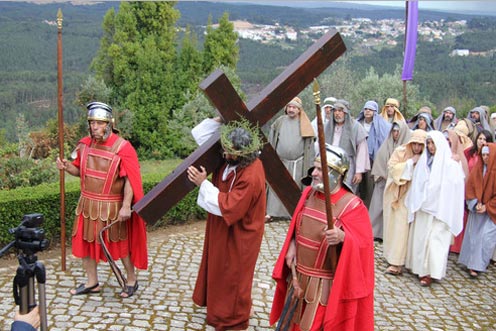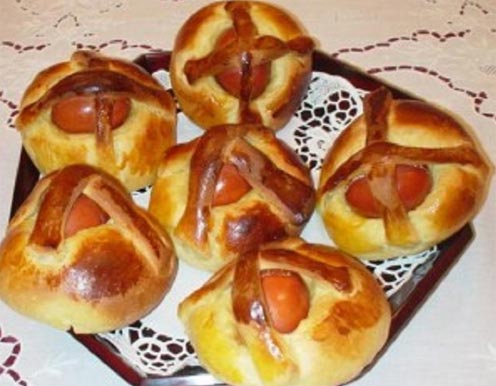Easter in Portugal
Together with Christmas, Easter is one of the two most important times during the year in the Christian universe. The celebration of the resurrection of Jesus from the dead is the high point of the Passion of Christ and Lent periods.
By the nature of the event it commemorates, Easter is a very solemn but also joyful holiday, which in many parts of the world coincides with the arrival of spring.
Easter celebrations start before the proper Easter Sunday, on the Maundy Thursday, which relates to the Christian tradition of washing the feet, a symbolic representation of humility which is considered one of the major virtues of a good Christian. Remembering the Last Supper, the last meal had by Jesus with his disciples is also an important element of Maundy Thursday.

The Passion of Christ recreated in Ourém, Portugal
The following day of the Holly Weak, Good Friday, commemorates the crucifixion and death of Jesus, (being in many countries a public holiday). Easter celebrations culminate in the Easter Sunday when Jesus is believed to have risen from his grave.
Easter is a movable holiday, which date is set around the March equinox (during the equinox sun shines directly on the equator making the length of the day and night nearly equal).
Easter in Portugal – celebrations and traditions
In Portugal, a country of a very strong Catholic tradition, Easter (in Portuguese ‘Páscoa’) festivities are relatively low-key, at least as long as their religious aspect is concerned. Easter is commonly associated with days-off, time with family and friends and possibly travelling as there is usually around 2 weeks break for school children at the time.
The retail is, of course, very aware of this important time of the year and Easter decorations appear in shopping centres and popular tourist areas nearly as soon as the Christmas decorations have been put away.
In order to experience Easter traditions in Portugal, you need to travel outside of the big city centres. It is in the rural areas where the centuries-old rites are still very much alive and varied for that matter. Palm Sunday processions, the Passion of Christ (via sacra) processions, as well as many local traditions mark that time of the year across the country.
Northern Portugal offers probably the greatest variety of Easter celebrations. Viana do Castelo, Santa Maria de Feira, Castelo de Vide or Serpa, for example, are some of the northern Portuguese towns where the tradition of the burning of the Judas has been preserved. During a Queima de Judas, a doll made of straw representing Judas is burned or blown up.
Also in the North, he city of Braga, often referred to as the City of Arch Bishops, is known for its prominent religious Easter tradition, amongst them the washing of the feet ceremony, performed by the Archbishop of Braga, followed by the very solemn Mass of the Lord’s Supper.
Also Obidos, a picturesque, fairy-tale like medieval town, 50 miles north of Lisbon, is a stage to a particularly festive Easter celebrations, which involve processions, concerts and recreation of via sacra, engaging many of the town’s residents, as well as visitors. See footage from the Holly Week celebrations in Obidos in 2015:
If you happen to be visiting the southern part of Portugal, the Algarve, during the Easter season, don’t miss out on the Festa das Tochas Floridas, in São Bras do Alportel, during which the whole town centre gets beautifully decorated with flowers and flower petals before the Via Sacra procession:
Traditional Portuguese Easter food
A great majority of visitors to Portugal is, understandably, after sea-food which is of excellent quality here and reasonably cheap.
There are no really many typically Easter dishes in Portugal. Other than cod, consumed in form of many different dishes on Good Friday, lamb roast or roasted suckling pig are popular on Easter Sunday. If one type of food typical to Easter only had to be pointed out, it would probably be folar de Páscoa, a type of a sweet bread, resembling cake actually, vey characteristic because of the eggs boiled in shell, which are incorporated into the dough:
Chocolate eggs, in all possible ways of forms, as well as caramel or chocolate covered almonds are the favourite sweet snacks during Easter season in Portugal.
Easter holiday in Portugal?
The Easter is a great time for a spring holiday in Portugal. During most of the years the weather is already warm to very warm, allowing to enjoy the many of Portugal outdoor wonders, and without the inflated prices of the high season. If you are lucky, you will be even able to spend a few summer-like days at the beach.
Do not count, however, on warm ocean bathing; during the winter the Atlantic has cooled down considerably and for most people the water temperature is not comfortable enough to swim.
See more details on spring weather in Portugal (Lisbon) in a year graph.
Please notice that Good Friday is public holiday in Portugal which means that some of the museums and other attractions may be closed. Public transportation schedules may be affected too. In the bigger cities you should not encounter any problems with eating out, even during Easter Sunday. In the rural Portugal, though, the towns and villages may become quite deserted during that day.



